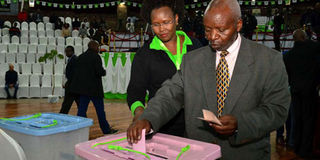Why those extra ballot papers won’t find their way into boxes

James Wanjohi, assisted by an IEBC officer, casts his vote in a mock session on July 28, 2017. At the end of polling, the officer records the number of unused ballot papers and provides the same to the agents. PHOTO | FRANCIS NDERITU | NATION MEDIA GROUP
What you need to know:
- It is important that we hold accountable agents and observers in each polling station.
The credibility of any electoral process is judged by the level of transparency, information sharing and involvement of all the stakeholders.
From July 27 to 30, a team made up of 20 representatives from the Inter-Religious Council of Kenya, five presidential candidates, the Political Parties Liaison Committee, the Electoral Observation Group (ELOG), the media and Independent Electoral and Boundaries Commission (IEBC) officials worked from the Al Ghurair Printing Press in Dubai to ensure due diligence in the production of the presidential ballot papers for the August 8 General Election.
BALLOT PAPERS
As many of the members have attested, all the concerns raised were addressed “with speed”.
Even with the confidence expressed by the ‘Due Diligence Team’ on the integrity of the process, there has been a lot of misinformation around the printing of extra ballot papers.
The IEBC was the first to inform Kenyans that as part of the regulations, we are required to print an extra one percentage of the ballot papers for each elective position, and not just for the presidential race.
SPOILT BALLOT
This is because, the law provides for a voter who spoils his/her ballots to be given new ones up to twice.
This translates to three ballot papers, in case of mistakes that one voter might make.
This obviously is before he/she places the ballot in the box.
In the polling day diary, and in the presence of agents, the presiding officer records this information.
BOOKLETS
We have also been clear that it is not only the one percentage of ballot papers we have, purely due to administrative reasons.
Each ballot paper booklet is printed in sets of 50.
This means that for Pumwani Primary School polling station, for instance, there are 319 registered voters, if you add the one per cent provision in law, you will have 322 ballot papers.
However, as the booklets are printed in sets of 50s, if you round off 322 to the nearest 50 you will have 350 ballot papers.
CUSTOMISED
This information per polling station has been provided on our website, in yet another novel initiative.
There are concerns that extra or foreign ballot papers will make their way to the ballot boxes or be used in other polling stations.
There are six reasons why that would not happen.
First, unlike in the 2013 elections, the ballot papers and results forms have been customised per polling station.
SERIAL NUMBERS
It is not possible to use ballot materials not meant for that polling station.
Second, at the opening of the polling station, the presiding officer shows the agents the number of ballot papers issued and records them in the polling day diary, complete with the unique serial numbers.
At the end of polling, the officer records the number of unused ballot papers and provides the same to the agents.
OFFENCES
Third, at three-hour intervals on the polling day, the presiding officer reports to the returning officer the number of ballots issued and the IEBC tracks this against the voter turn-out at that particular time.
Any inconsistencies will be detected immediately and action taken against the presiding officers, in case of electoral offences.
Fourth, the Kenya Integrated Elections Management System (Kiems) gadgets cannot allow a presiding officer to transmit more results than the number of registered voters in a polling station.
STUFFING
This ensures that there is no ballot stuffing and that any attempts to manipulate the system will fail.
Fifth, the regulations are clear that the IEBC will annul results from any polling station that has more than the number of registered voters.
This means that even in the worst case scenario of the failure of Kiems, ballot stuffing is mitigated against.
ACCOUNTABILITY
Lastly, the agents of each party or candidate have a responsibility to ensure that these things do not happen.
As Kenyans call on the IEBC to ensure free and fair elections, it is important that we hold accountable agents and observers in each polling station and I urge them to carry out their part of responsibility with utmost professionalism.
Ms Akombe is a commissioner with the IEBC




